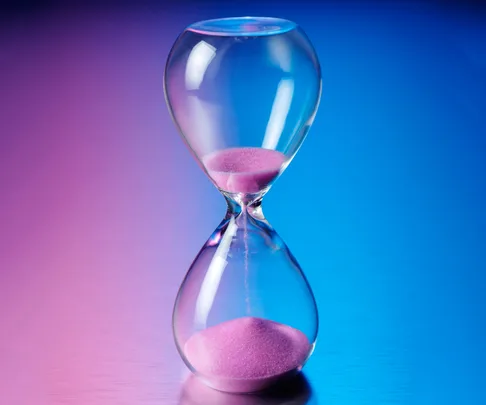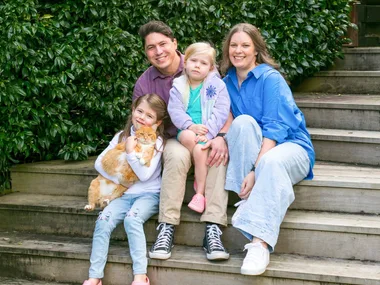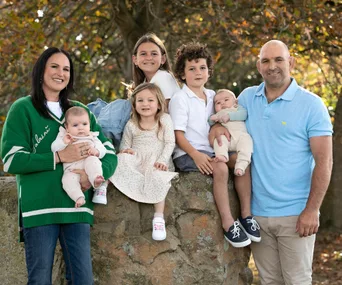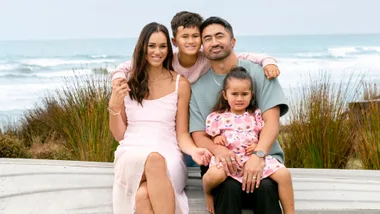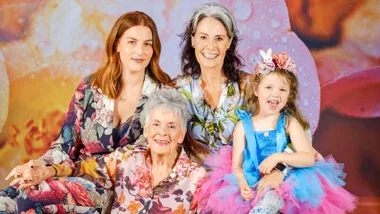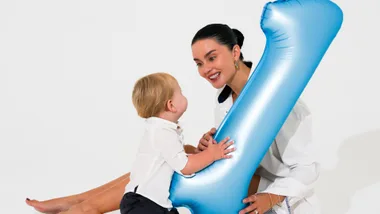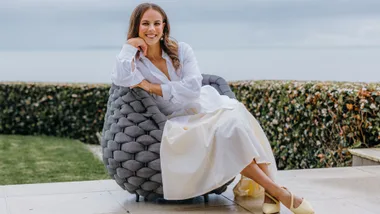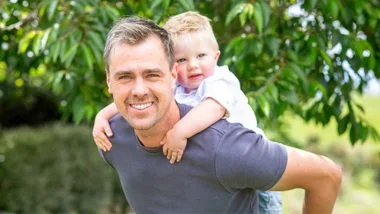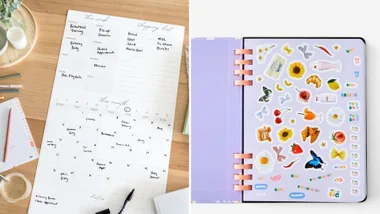Sue* was just 22 when she was treated for endometriosis and mild polycystic ovaries. She always knew the condition might impact on her desire to have children but she wasn’t prepared to rush into having a baby.
Fast-forward five years and she was undergoing a routine check-up at Family Planning.
“I was shocked to be told if I wanted a child, I needed to start thinking about getting pregnant as soon as possible,” recalls Sue. “That’s when I first experienced the kind of societal pressure around the whole idea of ‘make sure you have a baby early and don’t get too old.’”
Instead, Sue waited until 35 to begin her family as she wanted to ensure she and her partner had time to focus on their careers.
“When I was told by Family Planning I should be getting pregnant, I felt we weren’t at all ready. We were travelling a lot for work. That’s when I decided if I waited and I wasn’t able to get pregnant later on then it just wasn’t meant to be our journey.”
Today Sue and David have been together for more than a decade and are proud parents to a beautiful one-year-old girl. Neither has any regrets about waiting until they were settled and financially ready.
“We talked about children quite a lot but we waited until it was the right time for us. I had no expectations and got pregnant quite quickly. I know I’m lucky,” Sue says. “Career is a massive reason why many of my friends waited and now a couple of them are struggling to conceive.”
There’s no doubt about it; New Zealand women are part of a trend. UK statistics confirm for the first time since records began that the number of mothers having their first babies over the age of 35 has overtaken the number of women having their first babies under the age of 25. The population data proves what has been known anecdotally for far longer – in the Western world, particularly, women are waiting far longer to start their families.
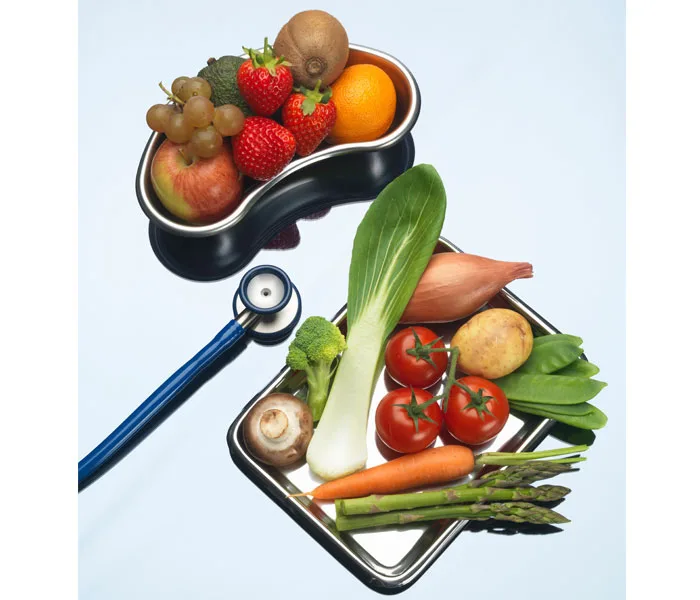
The National Women’s Health Annual Clinical Report confirms there’s been a sharp increase in the number of older mothers giving birth at the National Women’s Hospital between 2000 and 2013.
Meanwhile, the most recently released Perinatal Report detailing all births in New Zealand confirms the average age of mothers in 2013 was 29.32 years. Also of interest are figures showing the proportion of births to mothers under 20 years has been falling steadily since 2008, while the proportion of births to mothers aged 40 and older increased significantly from 3.76 per cent in 2007 to 4.41 per cent in 2013.
So what’s driving this change? And what are the benefits and risks of having a child at the age of 35 or over?
Obstetrics and gynaecology expert Professor Cindy Farquhar – co-chair of the international research body Cochrane Steering Group and co-ordinating editor of Cochrane Gynaecology and Fertility at Auckland University – stresses older women simply need to be aware of the overall higher risk of pregnancy complications over the age of 30, versus the lifestyle considerations regarding the best time to first conceive.
“As you get older, you put on more weight and there are problems associated with being overweight during pregnancy, such as gestational diabetes and high blood pressure.”
But even with the biological factors and complications that may occur for women who have babies later in life, Farquhar is clear – a woman must make the best decision for her personal situation.
“The right time to have a baby is when you’re really ready,” she says. “There’s no point in getting anxiety if you’re 26 and not in the right life situation.”
From Farquhar’s experience in clinical practice, she says one of the most common anecdotal reasons women give for starting a family later in life is that they need to find a partner they feel will genuinely support them.
“There are a number of advantages in waiting longer, such as job security and relationship stability,” explains Farquhar. “But from a biological view, you do need to think about the size of the family you want. If having a baby is one of your big life goals then you should be trying by 34-35. However, some people would disagree and say this is too late.”
Yet among the New Zealand women we spoke to who have waited until 35 or over to have their first child, they all agreed they made the right choice for their circumstance.
Sophie Elworthy became pregnant with her first child at 40 and just like Sue had also suffered from endometriosis. But it wasn’t her health condition that caused her to delay conception; she wanted to find the right partner first.
“I just didn’t want to have a baby without being in a relationship with someone who wanted the same, and my partner and I were ready when I was 40,” explains Elworthy.
Waiting to find the right guy and then being ready to start a family meant Elworthy was well aware of the impact age could have on their ability to conceive. To help herself be in the best shape possible, she exercised regularly and used other natural therapies to support her body in the lead-up to and during pregnancy.
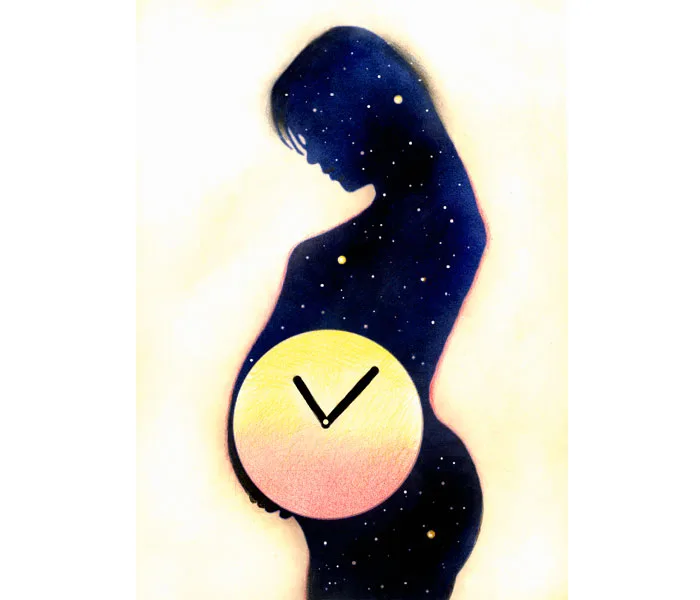
“I had a lot of acupuncture and also used herbs,” she says. “I’m definitely into more natural or alternative methods of healing and ate very well during pregnancy too, choosing organic foods. It was worth trying to be as good as possible to my body and to exercise. My pregnancy seemed like that of someone much younger.”
Rachael Easterbrook was also keen to ensure she had met the right man before getting pregnant with her first child at the age of 36. However, she admits she definitely faced some pressures from acquaintances, who weighed in on when they thought the time was right for her.
“The most important thing I’ve learned is to trust your instincts,” says Easterbrook.
“Don’t listen to others’ opinions on when they think you should have children. It just hadn’t been the right time in my life up until that point,” she continues. “I had been studying, working and then travelling so had different priorities. I hadn’t found anyone to settle down with until then.”
However, when she met and fell in love with partner Anthony Rawlinson she knew she was ready to have kids. Today, they are proud parents to two young, rambunctious girls.
“I possibly would have had them earlier if I’d found the right person to have them with but I’m of the mindset that whatever will be will be.”
Like Elworthy, she was aware age could affect her fertility and advises other women over 35 to “know and respect what you and your body need”.
“We did approach my doctor prior to getting pregnant to make sure I was taking the right supplements and to go off medication for my epilepsy prior to conceiving,” she explains.
“For me it was all about being as healthy and active as possible. My best advice is to ensure your body is ready to carry a child… and be kind to yourself.”
It’s a sentiment Gina* shares. She held off her pregnancy until she felt well-established in her career. As the higher earner in her relationship, both wanted to ensure Gina had gained enough experience in her industry to make workforce re-entry easier should she wish to return at the same senior level.
Highly engaged in her work prior to having a baby, it wasn’t a decision Gina and her partner took lightly. Both knew if they waited until she was 35, it could take her longer to get pregnant. She says what made things easier was discussing the challenges they could face in-depth before she became pregnant and making an action plan for each possible variable.
“We decided we’d try for a year before starting to research fertility treatments,” she says. “We knew the longer we left it, the chances of conceiving would naturally decrease. And then any help with fertility can increase the chances of multiple births so we made a plan that 35 was the age to give it a go. We both wanted kids but until then we weren’t ready. It was important I didn’t put any pressure on myself to get pregnant straightaway and understood that because I was coming off the pill after a long period, my body needed time to adjust.”
Farquhar agrees even though we’re waiting for both financial and emotional reasons, as women age, it’s important to make a plan about when is best to start your family.
“Having a baby is the hardest thing most women will do in their lives so don’t do it until you are ready,” she says.
She also stresses it’s important to realise mental health plays a key role.
“Mental health problems are most likely to happen around the time of pregnancy,” says Farquhar. “That’s why you want to look after yourself and have a baby when the time is right.”
Elworthy, Sue, Easterbrook and Gina all agree. While they all had different reasons for having babies age 35 or over, all say trusting their instincts about knowing when the time was right for them to have their first babies was important for building happy, healthy families.
Although Elworthy jokes that women waiting until they’re older to have their first babies means you’ve had a lot more time to enjoy long sleep-ins.
“You possibly get more physically tired when you’re older but younger mothers I know seem just as tired. I think they probably just question it less,” she smiles.
“When you’re older, you know your body better and you’ve had a lot of time to sleep in so you know what you’re missing out on!”
Names have been changed to protect privacy
Words: Kylie Bailey
For more from NEXT, follow us on Facebook and Instagram here.
